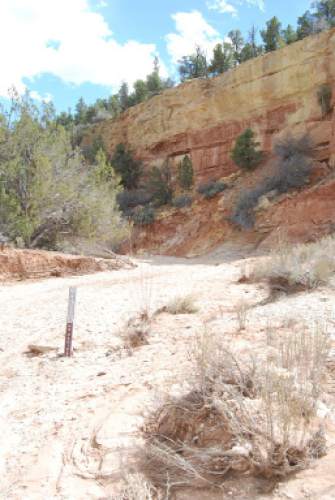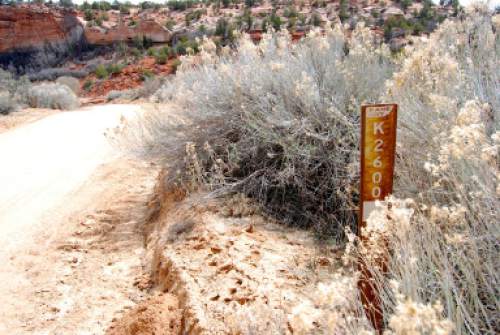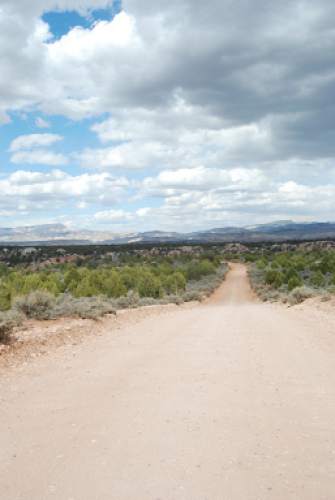This is an archived article that was published on sltrib.com in 2014, and information in the article may be outdated. It is provided only for personal research purposes and may not be reprinted.
The 10th U.S. Circuit Court of Appeals in Denver has overruled key parts of a Utah judge's recent decision to award Kane County and the state title to 12 routes on federal land.
Tuesday's ruling was hailed by environmental groups that claimed in amicus briefs that U.S. District Judge Clark Waddoups was too generous in 2013 when he recognized the routes, some through the Grand Staircase-Escalante National Monument, under a repealed frontier-era statute.
A three-judge panel concluded that routes deemed open in the Bureau of Land Management's travel management plans are not really in dispute. Accordingly, the judges said, the court lacks jurisdiction to award title under RS 2477, an old statute that allows states to claim rights of way if they can show 10 years of continuous use prior to the law's repeal in 1976.
The judges' ruling overturned Waddoups' decision to designate six of the 12 routes and narrowed the right-of-way widths the Utah judge approved for three of the routes.
"It's a partial victory for the federal government and, at the same time, cuts Utah's 'win' at the district court in half and then some," said Steve Bloch, legal director for the Southern Utah Wilderness Alliance.
The decision was written by veteran 10th Circuit Judge Paul Kelly, a former New Mexico lawmaker appointed to the court by President George H.W. Bush.
State attorneys saw much to like in the ruling, but said they intend to return to the 10th Circuit to seek clarification.
"On balance, it's a favorable decision," said Assistant Attorney General Tony Rampton, who leads the office's public lands section. The 10th Circuit affirmed the state's claims to six of the roads. "But even with the other six, the court said if there is no dispute to the title, the state and county can assume their title is good and they can treat these roads as county roads and manage them accordingly."
The 12 routes dissected in the case are not the only claims at stake. Thousands of rural Utah road claims are awaiting action in Salt Lake City's federal court.
The Kane dispute is a crucial test salvo in the state's comprehensive legal campaign against the federal government to win at least 12,000 routes on BLM land. Appellate rulings on the dozen Kane County routes will provide guidance for resolving the remaining cases, which are expected to take years to play out in the courts.
Besides reversing Waddoups on six of the routes, Tuesday's ruling also rejected the Utah federal judge's decision to give the state a 60-foot right-of-way along the Skutumpah Road, which traverses the national monument.
Utah did prevail on a number of lesser points, but Tuesday's decision leaves unanswered the vital question of what happens to routes where there is no dispute over whether they are open to travel.
"It remains cloudy on just exactly what the state and county's rights are," Rampton said. "We need these things resolved one way or another, or we could drift along for the next 50 years."
A critical section of Tuesday's ruling focuses on Sand Dunes Road, a 20-mile thoroughfare in the southwestern part of the county, and a paved side road, along with four spurs called the Cave Lakes roads. BLM travel plans indicate the roads are to remain open, so the judges reasoned there is nothing to fight over.
Elsewhere in Utah, many routes counties are fighting the federal government over fall into a similar category.
"It's a blow to the state's RS2477 lawsuits because the court made clear that it's not going to hear the majority of the state's claims," Bloch said. These routes "are open on the ground and that means there is no live dispute. There has to be a dispute for the court to have jurisdiction."
Rampton said his office will seek clarification on the point either by petitioning the panel for a rehearing or seeking an en banc review by the entire court.
SUWA participated in the case as a friend of the court along with other environmental groups, including the Sierra Club and the National Parks Conservation Association. Although the court rejected some of their arguments, the groups do not to intend to appeal.







